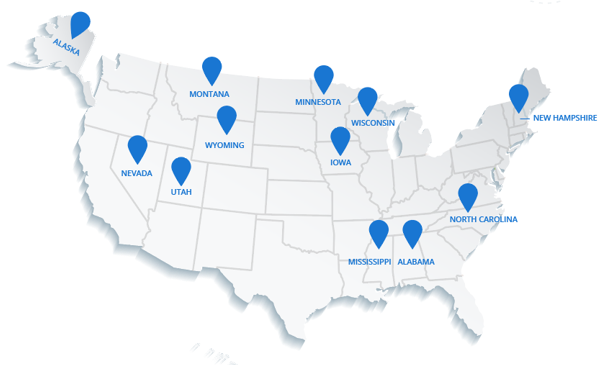If you've spent time following society,s changes over the past year, you may have come across the term digital nomad. The phrase conjures up images of young influencers living the good life on some tropical beach.
As a locum tenens provider, you already know a thing or two about a life that transcends boundaries. In this article, you will learn how to improve as a locum tenens clinician through the power of upskilling. A good (and employable) locum is one who strikes a fine balance between professional and personal skills.
What is Upskilling?
The term upskilling generally refers to learning new skills. This can be done for the advancement of your career, for personal satisfaction and for improving the overall quality of your service. This can be done at your current place of work or future ones as well.
In terms of locums work, upskilling is an absolute necessity with the world of medicine constantly evolving. One never knows what locum life can throw at you! Constant learning and upgrading your existing skill set is of the utmost importance if you want to stand out in a locums role.
Due to the ephemeral nature of each locums assignment, a locums provider needs a higher level of personal skills than your average clinician. A very particular set of character traits will allow you to handle the demands of the job with relative ease.
More than just your bedside manner, a whole host of other skills will distinguish you as a locum from a standard medical professional. In the next section, we,ll explain what these skills are and why they,re so essential for every aspiring locum.
Essential Skills for Aspiring Locums to DevelopLife as a locum certainly has its perks, and it,s not surprising to see a steady rise in professionals choosing this path. However, the nature of locums work demands several particular professional and personal characteristics from aspiring locums.
- Reliability A locum should immediately project a professional image. Showing up at the time you said you would is of paramount importance in this role. Remember that you're taking over someone else,s responsibilities, and consequently their schedule too. Expect to be on call to cover staff shortages, peak hours and holidays as well.
- Flexibility The biggest perk of being a locum is also the biggest responsibility. You,ll be expected to travel to different locations and organizations at short notice. The ability to quickly adapt to whatever life as a locum throws at you is something every employer will expect.
- AvailabilityKeep your schedule free, because you will be expected to spring into action at any time. If you,re specialized in a niche field or one that has ongoing demands, being available at all times is crucial to a fulfilling Locum career.
- Tech SavvinessEvery hospital has their own preferred EMR. You'll be expected to learn the ropes soon, and the nature of locum positions dont give you much time to do so. As a result, working knowledge of various tech basics is a crucial help if you want to perform your duties to the best of your ability.
- OrganizationFrom paperwork to your own career, stellar organisation skills are essential to locums. Every employer requires several documents including your timesheets, clinical logs and other records.Being able to produce them at a moment,s notice will create a great first impression. In many cases, it will land you a job.
- HonestyHonest communication with your employer as well as your patients is essential if you want a stress-free career. Be honest about what your strengths are and what you can do. Remember, underselling yourself is better than underperforming.
- A Thick SkinYou must learn to roll with the many punches that locums life throws at you. The nature of the job requires you to be at ease without the support of an established team. Criticisms are a part and parcel of locum life, and you need to have a thick skin so that your feelings don,t come in the way of performing your duties efficiently.
Why Locums Should Spend Time Upskilling
- Improve Your Productivity - Learning tech and management skills can significantly improve your efficiency and productivity . There are several free tools available online that can automate some mundane tasks wherever you are, which frees up your schedule by quite a bit. For example, time management apps turn an otherwise tedious task into a sort of game with inbuilt rewards which gives a much needed push.As for management skills, YouTube is your friend. There are millions of free videos and podcasts on how to effectively manage your time and your workload.
- Boost Your Self-Confidence - A better skillset leads to better quality of work, which in turn boosts your feelings of accomplishment and self-confidence. As a locum you need confidence to be able to handle tough patients and negotiate effectively with your employers. Any course that focuses on self-improvement is a great way to do this.
- Make Workplace Changes Easier to Handle - Life as a locum can be more unpredictable than a traditional clinical role. You,ll need to be able to adapt to changes both in the field and within your place of work. Whether it,s a change in procedures, schedules, responsibilities or management itself, as a locum one should be prepared for it all and upskilling can help you do just that.
- Allow You to Leverage New Technologies - Everything is computerized these days and this doesn,t have to be a pain anymore. With the right technical training and basic coaching about the features of the various tools, the administrative side of work can be a piece of cake. This frees up your schedule so you can focus on what really matters, transforming your patients, lives.
- Develop Your Soft Skills - As a locum, you need to form meaningful and personal connections with all your patients. You need to humanize yourself to people who might look at you as a figure of authority or a stranger. There will be times when your clients aren,t able to clearly communicate what their medical issue is, due to excessive pain, language barriers or just simply a lack of knowledge about their symptoms and ailments. This is when soft skills like clear and effective communication, empathy and fluency in several languages become invaluable. A working knowledge of human psychology can help you better understand the patient,s mindset and perform your medical duties more effectively.
- Positively Impacts Communities - Most locums choose this career path for the sheer love of serving people and communities who are traditionally unreached by quality medical services and facilities. This includes the poor, women, BIPOC and rural communities. Your medical expertise combined with your upgraded skill set can greatly improve the quality of life in these communities and impact individuals, lives in positive ways.
How Can Locum Tenens Providers Upskill?
For a locum, additional skills and certifications can make all the difference in a competitive employment situation. At the same time, your employer won,t contribute to your education due to the temporary nature of your role.
It,s a good idea to keep track of the newest and most in-demand certifications and skills in your specialty as well as the medical field as a whole, so that you,re a great candidate for any job that you choose to apply to. Allocate a few hours a week to track trends, and make it a priority to learn a new skill at least every 3 months or so.
You can upgrade your skills in your specialty by signing up for additional certification courses online. There are several educational platforms where experienced specialists share their expertise and knowledge on the latest technology, drugs and treatment options.
Broadly speaking, the most in-demand skills in healthcare organizations today are data science (turn on Microsoft Excel!), nutrition, epidemiology and comfort with basic telemedicine tools. A few examples of these tools are remote vital monitoring, virtual stethoscopes, wireless scales, thermometers, digital otoscopes, pulse oximeters, high-quality cameras for specialty practices and HIPAA-compliant software.
The flexible nature of online courses, and the shift in acceptance of remote CME, enables locums even in rural areas to upskill at their convenience anywhere and anytime. Courses are usually reasonably-priced and often offer lifetime access to the course material. This gives online learning an edge over traditional methods of learning and its cost effective to boot.
If you've spent time following society,s changes over the past year, you would,ve come across the term digital nomadâ. The phrase conjures up images of young influencers living the good life on some tropical beach.
When it comes to personal skills and soft skills, there are a plethora of self-help and personality development books and seminars available. You need to look no further than YouTube for extensive and excellent videos on these topics. They make for perfect background listening while you,re doing administrative tasks!
March 4, 2021




Comments